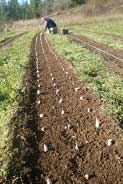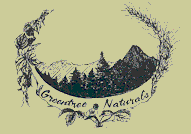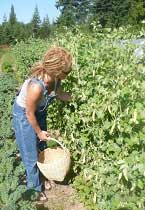 |
 |
 |
 |
 |
 |
 |
 |
 |
 |
|
Greentree Naturals Newsletter Winter 2012
Thom Planting Garlic If you took the time to read our Holiday Newsletter, which is typically an overview of the year at a glance, you reviewed our 2011 season a brief paragraph at a time. I see the value of the annual holiday newsletter because the annual Christmas card & newsletters are often the only time we have contact with some people. I have always been a firm believer that Holiday newsletters should never be more than a page long and for the life of me, will never understand why some newsletters turn into short stories four or five pages long, filled with information that only a grandmother would find joyful. That said, the holidays behind us, we look to the New Year with hope and continued optimism. Truly, all farmers have to be optimistic. We have to believe that those seeds we plant will grow; why else would we take the time to feed the soil, prepare the beds, and invest time and money into growing food? We are creative thinkers, with a vision of a bountiful harvest of sweet sugar snap peas, and ripe-on-the-vine Sungold tomatoes that taste like candy. The garlic that we planted last October lays dormant in the frozen soil; hopefully those cloves of garlic that we planted are dreaming about growing into giant, succulent bulbs of Spanish Roja and Great Northern that will feed our customers and our bank account next July when we harvest. *This is a picture of Thom planting garlic cloves in the fall… The weather is definitely changing since we first started growing here. I think Mother Nature will do whatever she pleases and we might as well be adaptable to whatever comes. Another requirement of being a farmer is that we adjust, adapt, readjust, invent and reinvent as we go. We assess how things went last year, we look at gross profit analysis, total our harvest records and compare the last three years with the ten years before that. What made us a good income five years ago might not have done quite as well last year. The variables could be because of the weather, the economy, the lack of tourists at the farmers market, or the fact that there are more growers selling the same thing at the market. We can only really guess what the reasons are. But you know what? After every reassessment, we are still convinced that growing good organic food, and teaching others how to do the same, is what we need to be doing. There is nothing easy about what we do, but indeed, we do love it. I’ve been thinking a lot about what it means to build a local food system, and pondering how it can actually work. I think there are many different ways to develop food systems that are economically, environmentally, and socially sustainable. Ideally, we have small acreage farmers growing food to feed their neighboring community; and the community is willing to support their local farmers by purchasing the food that we grow. That seems pretty simple. We all need to generate public awareness of the importance of local and regional food systems that will provide healthy, fresh, affordable food, preserve natural resources, and support vibrant rural communities. The thing is, if local communities aren’t supportive of their local farmers, there isn’t going to be local food. And of course, if there aren’t local farmers being successful, there won’t be local food. It is indeed a very delicate cycle.
I know that I sound like I am on a soapbox here, and likely that I am preaching to the choir, but what I am talking about is heavy on my mind these days. We have had a couple of very challenging years farming, and have no desire to quit doing what we are doing, but it is a very fine line sometimes. We are pretty used to living minimally and clearly know the difference between needs and wants. We call it comfortable poverty. We are quite determined to continue moving forward in a direction that will allow us to continue farming, teaching and empowering the next generation of small acreage sustainable and organic farmers. We appreciate your support and encouragement. I will close this newsletter with a quote from Henry David Thoreau: “Don’t let go of your dreams and aspirations. If you do you will cease to exist.” We hold true to our dreams and aspirations and suspect that Mr. Thoreau would be proud!
|
2003 Rapid Lightning Road, Sandpoint, Idaho 83864 • 208-263-8957 • info@greentreenaturals.com
Site Design by Logical Expressions, Inc.


 In 1920, when my mother was a young woman, 30% of the population in the US was farmers. To say “I am a farmer” was a proud stance. To date, 1-2% of population is farmers. There are more people locked up in prisons in the US than there are farmers growing food for our population right now. There are many reasons for this transition, once a farmer quits farming, if the children don’t want to farm, the land is typically sold and developed into rural or urban housing. It’s scary and something that everyone needs to consider. We need the ability to feed ourselves. I think the farmer and the consumer have a very symbiotic relationship; we need your purchasing power and you need us to supply the food. Wherever you live, do yourself and your community a favor and find a local farmer that will help feed your family. Join a CSA or use your shopping dollars to buy locally grown whenever, wherever you can. As a consumer, and a local food and farmer advocate, you can help make a difference.
In 1920, when my mother was a young woman, 30% of the population in the US was farmers. To say “I am a farmer” was a proud stance. To date, 1-2% of population is farmers. There are more people locked up in prisons in the US than there are farmers growing food for our population right now. There are many reasons for this transition, once a farmer quits farming, if the children don’t want to farm, the land is typically sold and developed into rural or urban housing. It’s scary and something that everyone needs to consider. We need the ability to feed ourselves. I think the farmer and the consumer have a very symbiotic relationship; we need your purchasing power and you need us to supply the food. Wherever you live, do yourself and your community a favor and find a local farmer that will help feed your family. Join a CSA or use your shopping dollars to buy locally grown whenever, wherever you can. As a consumer, and a local food and farmer advocate, you can help make a difference.